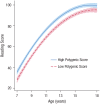The Genetics of Success: How Single-Nucleotide Polymorphisms Associated With Educational Attainment Relate to Life-Course Development
- PMID: 27251486
- PMCID: PMC4946990
- DOI: 10.1177/0956797616643070
The Genetics of Success: How Single-Nucleotide Polymorphisms Associated With Educational Attainment Relate to Life-Course Development
Abstract
A previous genome-wide association study (GWAS) of more than 100,000 individuals identified molecular-genetic predictors of educational attainment. We undertook in-depth life-course investigation of the polygenic score derived from this GWAS using the four-decade Dunedin Study (N = 918). There were five main findings. First, polygenic scores predicted adult economic outcomes even after accounting for educational attainments. Second, genes and environments were correlated: Children with higher polygenic scores were born into better-off homes. Third, children's polygenic scores predicted their adult outcomes even when analyses accounted for their social-class origins; social-mobility analysis showed that children with higher polygenic scores were more upwardly mobile than children with lower scores. Fourth, polygenic scores predicted behavior across the life course, from early acquisition of speech and reading skills through geographic mobility and mate choice and on to financial planning for retirement. Fifth, polygenic-score associations were mediated by psychological characteristics, including intelligence, self-control, and interpersonal skill. Effect sizes were small. Factors connecting DNA sequence with life outcomes may provide targets for interventions to promote population-wide positive development.
Keywords: adult development; behavior genetics; genetics; intelligence; personality.
© The Author(s) 2016.
Conflict of interest statement
Figures






References
-
- 1000 Genomes Project. (2016). 1000 Genomes project data. Retrieved from http://www.1000genomes.org/
-
- Breen R., Jonsson J. O. (2005). Inequality of opportunity in comparative perspective: Recent research on educational attainment and social mobility. Annual Review of Sociology, 31, 223–243. doi:10.1146/annurev.soc.31.041304.122232 - DOI
-
- Breen R., Salazar L. (2011). Educational assortative mating and earnings inequality in the United States. American Journal of Sociology, 117, 808–843. doi:10.1086/661778 - DOI
Publication types
MeSH terms
Grants and funding
LinkOut - more resources
Full Text Sources
Other Literature Sources

